

The Fatherly Guide to Screen Time. Technology, whether in the form of phones, TVs, or murderous robots, isn’t going anywhere.

Every year, it plays a bigger and bigger role in the way kids grow up in. The Most Dangerous Apps for Teens. It’s easy for teens to download free apps.
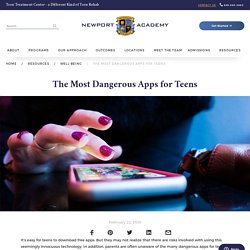
But they may not realize that there are risks involved with using this seemingly innocuous technology. In addition, parents are often unaware of the many dangerous apps for teens. Teen apps can expose kids to the possibility of cyberbullying. Furthermore, teens who use anonymous chat apps are vulnerable to predators. How teens use fake Instagram accounts to relieve the pressure of perfection. Fake Instagram accounts, often referred to as “finstas” or “spam accounts”, have become the norm for many teens – but their reasoning for creating these is not as sinister as you think.

I’ve spoken with 50 Australian families – including 118 children aged 1-18 – about technology use, and am currently conducting a follow-up qualitative investigation with a further 25 teens about their social media use. The data for both studies will be published this year. My investigations show that teens’ use of social media is constantly shifting in new ways in response to changes to social media platforms, the teen’s age and social context.
The Impact Of Social Media On Youth Mental Health - Key Assets Kentucky. By: Jennifer Hall Social media sites like Facebook, Twitter, Instagram, and Tumbler have had a profound impact on the ability of people—both young and old—to identify, cultivate, and grow communities through shared online content and commentary.
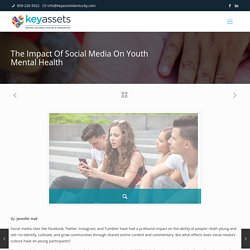
But what effects does social media’s culture have on young participants? Because today’s social media giants have only been with us since the mid-2000s, little long-term research has been done to assess the effects of social media participation on young users. Some trends, however, seem to be emerging. Positive Impacts. Filters and photo manipulation on social media sites are creating a generation of deluded adolescents. Social media is becoming a platform for people to reinvent themselves, allowing users to present themselves in the best manner possible to increase their ‘perceived attractiveness’.

With the help of social media sites, insecurities become perfections, and photo manipulation is now very much a formality. The accessibility of smartphones with forward-facing cameras is a dominant force within the mobile community and everyday life, heralding the age of the selfie. Selfies are a way of expressing yourself to friends, families, and total strangers. Whether you embrace it is at your own discretion. Nevertheless, it is inevitably a part of our society. Download the new Indpendent Premium app Sharing the full story, not just the headlines. What Is Sexting and Why Is It a Problem? Sexting is sending sexually explicit messages, photos, or video via cell phone, computer, or any digital device.
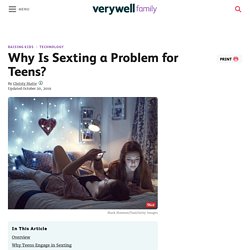
Sexting includes photos and videos containing nudity or show or simulated sex acts. It also includes text messages that discuss or propose sex acts. As teens and children increasingly carry cell phones and use tablets, social media, apps, and messaging, the risks that they will send or receive sexually explicit content has become a concern for parents, teachers, and law enforcement.
Sexting is often done as a joke, a way of getting attention, or as flirting. Family Circle. How to Use Instagram Geotag to Engage Local Followers. One of the best things about Instagram is the ability it gives you to reach people all around the globe.

When your brand shares a video or photo on Instagram, it could potentially be seen by people in New York to Australia, and everywhere in between. While that amount of reach is great, what if you want to get more granular and specific with who you target? Well, that’s when Instagram geotags come into play. Whether you’re a local business trying to reach nearby customers, or a global brand that wants to target audiences in specific regions, geotags will come in handy.
Plus, after the Instagram algorithm shifted the way content is displayed to users, your brand needs to find new and innovative ways to achieve as much reach as possible. What is the Hype About Followers. Teens and Selfies: What Parents Need to Know. While some teens would never post a selfie on Facebook, others can't seem to resist posting selfies on Instagram at least a few times per day.
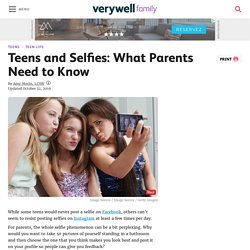
For parents, the whole selfie phenomenon can be a bit perplexing. 100 Social Media and Test Acronyms Used by Teens. If you've ever glanced at your teen's conversations over text or you've seen how she chats on social media, there's a good chance that you sometimes have no idea what she's talking about.
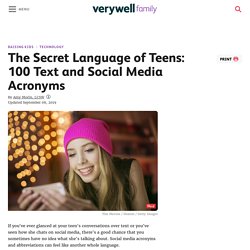
Social media acronyms and abbreviations can feel like another whole language. But it's important to learn what some of that shorthand means. Monitoring your teen's online activity won't be helpful if you can't understand what your teen is saying. You might allow unhealthy conversations to take place right in front of you.
Sexting & teens: what parents need to know. What is sexting?

Sexting is making sexually suggestive images and sharing these images using mobile phones or by posting them on the internet and social media. The images might be photographs of yourself or someone else naked or partially naked. Young people might call it sexting, and they might also use terms like sending a ‘nude’, ‘sexy selfie’ or ‘rude’ picture. Internet safety for teenagers. Why internet safety matters Teenagers use digital technologies for everyday activities like keeping in touch with friends on social media, relaxing and doing schoolwork. They also go online to look for support for physical or mental health problems, and sometimes to experiment with different ways of expressing themselves. Kik Safety Center.
Dangers of Secret Social Media. YouTube Kids. What should parents know about Kik? Stranger in the Console: Predators lurking in your child's gaming devices. FAIRFAX, Va. (WJLA) -- He was 8-years old, playing Clash of Clans on his handheld gaming device with friends online, when a new member of the clan messaged him mid-game. "She started asking weird questions like, 'Hey, do you want my phone number? '" said the boy, now 10-years old, who we'll call Grant for the sake of privacy, which he very nearly gave up to a stranger in the console. Kik App Review. Facebook “Messenger Kids” lets under-13s chat with whom parents approve. For the first time, Facebook is opening up to children under age 13 with a privacy-focused app designed to neutralize child predator threats that plague youth-focused competitors like Snapchat. Rolling out today on iOS in the US, “Messenger Kids” lets parents download the app on their child’s phone or tablet, create a profile for them, and approve friends and family who they can text and video chat with from the main Messenger app.
Tweens don’t sign up for a Facebook account and don’t need a phone number, but can communicate with other Messenger and Messenger Kids users parents sign-off on, so younger siblings don’t get left out of the family group chat. “We’ve been working closely with the FTC so we’re lockstep with them. ‘This works’, they said” Facebook product management director Loren Cheng tells me. “In other apps, they can contact anyone they want or be contacted by anyone” Facebook’s head of Messenger David Marcus notes. The launch could be a sign that Facebook is growing up. A win for Snapchat in crash lawsuit tied to speed filter. GRIFFIN, Ga. — A judge has dismissed claims against Snapchat that blamed the social media company’s “speed filter” for a highway crash. The judge said the Communications Decency Act provides the social media company with immunity. Snapchat attorney Mark Trigg told The Associated Press Monday in an emailed statement that the “the judge’s ruling in this case is precedent setting for the entire mobile app and product industry.”
Make your kid watch this anti-bullying video. How to Talk to Your Child About Cyberbullying Now - Positive Parenting Solutions Positive Parenting Solutions. The following is a guest post from The New York Times Best Selling author, Rachel Simmons. The recent suicide of 15 year old Phoebe Prince in South Hadley, MA has communities around the country reeling. Phoebe didn’t just suffer taunts, mean looks and harassment at school. She was cyberbullied: tortured online and by phone. Phoebe’s death – and an explosion in cyberbullying worldwide – are telegraphing an emergency message to schools and families: we must take action now. Yet the vast majority of schools decline to intervene with real consequences when cyberbullying incidents occur.
Secret ways your kids could be hiding nudes on their phones. The True Effects of Parents Shaming Their Kids Online. Teens turn to social media for attention, even in death. Modern youth prefer social media platforms such as Instagram, Twitter, and Facebook as a means to express themselves. Teen suicides rise with smartphone, social media use. Youth suicide rates are rising. School and the Internet may be to blame.
What is Live.me, how does the live streaming app work and why has it been linked to grooming and cyber bullying? LIVE.ME is a live streaming app that has hit the headlines after being named in a number of instances of online abuse. The Chinese made app has been mentioned by victims of trolling and even on occasion in cases of grooming. Here's the run down on the app. How to Deal With an Online Predator. Steps. How Predators "Groom" Children While Gaming Online - TeenSafe. Texting While Walking - Video - NYTimes.com. AT&T It Can Wait. Distracted driving is never OK.
Upload the photo you want to use as your pledge profile photo. We recommend you use a photo where you’re holding your right hand up, palm facing the camera, as a sign of your pledge to never drive distracted again. Use your camera to take your pledge profile photo. Place your hand up, facing the camera, as a sign of your pledge to never drive distracted again. Stop the violence! Teens' obsession with sharing fight videos on social media an alarming trend - Lifestyle - Burlington County Times - Willingboro, NJ. Dangerous Teen Challenges.
The Best Parental Control Software of 2018. Parenting in the Digital Age Modern kids have never known a time when they couldn't connect to the entire world via the internet. In fact, they probably spend more time online than anyone else—certainly more than their parents. Parents Who "Pranked" Their Kids On YouTube Have Lost Custody Of Two Children. Parent Concerns. 10 Dangerous teen challenges that could land your kid in the ER. Here’s the thing: Teenagers are just a few years away from being adults, according to the law. Internet Safety 101: Parental Control Websites. Calculator or Hidden App? Teens Are Disguising Content With Apps. In this day and age teenagers are more tech savvy than most adults. They chat on their smartphones with their peers, download all the popular apps and are greatly familiar with their device settings. Another recent thing that a lot of teens do on their smartphones is hide pictures, messages and apps.
Cell Phone Monitoring for Iphone and Android Smartphones and Tablets. Family agreement for internet use. Family Media and Internet Safety. Internet Safety for Kids: Teaching Kids About Internet Safety. Parents, Do You Know the Most Common Emojis Used in Sexting? - Educate Empower Kids. PARENT ALERT - Secret Teen Text Lingo. How to Find Apps That Hide Secrets. The 12 Apps That Every Parent Of A Teen Should Know About. Social media positive for teens? Maybe! - CNN. Social Media, Social Life: How Teens View Their Digital Lives. Teens and Technology. The Secret Social Media Lives of Teenagers. Teen Slang: The Complete 2018 Parent's Guide & Infographic. How Technology is Changing the Way Children Think and Focus.
5 Benefits of Having a Social Media-Savvy Kid. Demographics of Social Media Users and Adoption in the United States. SocialMediaSafetyParentsFBCG.pdf.